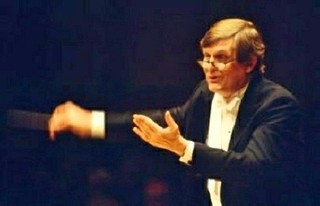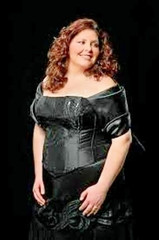|
Back
The Awe, The Terror New York
Avery Fisher Hall, Lincoln Center
01/15/2015 - & January 16, 17, 2015
Giuseppe Verdi: Messa da Requiem
Angela Meade (Soprano), Lilli Paasikivi (Mezzo-Soprano), Russell Thomas (Tenor), Eric Owens (Bass-Baritone)
New York Choral Artists, Joseph Flummerfelt (Director), New York Philharmonic Orchestra, Alan Gilbert (Conductor)

J. Flummerfelt (© Courtesy of the artist)
With the “Day of Fire, Day of Wrath” still scorching my eardrums, it might be inappropriate to call last night’s performance of the Verdi Requiem blazing.
But that was the only word for it. Conductor Alan Gilbert is almost always a master of his eclectic programs. But sometimes–like last night–he outdoes himself. No matter what the jibes about Verdi’s Mass–that it’s opera, that it’s secular, that (as one colleague said) it’s a ”party” Mass–nobody could fail to be aroused, electrified and absolutely terrified last night.
The terror last night due to an unfortunate coalescence. Instead of the words being printed in the program with a very proper Latin and Greek, the English word were hung on a screen above the orchestra and chorus. So an audience which expected to be enthralled were treated to a non-stop menu with “endless fire”, “dissolving the world in ashes”, ”nothing will remain unavenged”, “I groan as a guilty one”, “Deliver us from the mouth of the lion” etc. etc.
As if that isn’t bad enough, Alan Gilbert, whose physical movements are usually judiciously prudent, became the Master of the Universe last night, a windmill of action bringing in Verdi’s (original) circus-drum with an explosive bang, turning around to summon the Celestial Tuba Mirum trumpets on the Avery Fisher balconies like Michelangelo’s God giving life to mankind.
This was no Fauré or Mozart Requiem, nor did it have the mystical prayers of a Mahler. The way Mr. Gilbert conducted, it was an oratorio about the end of the world. And those Libera me prayers for forgiveness, redemption and faith were given short shrift compared to the roar of the trombones and male chorus of the Rex Tremendae, and the anguish of the Lachrymosa.
Mr. Gilbert powered his owns forces up from the beginning. Yes, the opening string chorus was almost unheard, but that only opened the way for the New York Choral Artists for a fervent prayer. (A prayer which Verdi showed was pretty hopeless during the rest of the piece.) The chorus, under that most demanding conductor, Joseph Flummerfelt, thundered through the Dies Irae, but performed the miracle of an actual transparency in the double-fugue Sanctus.
(I wish that we weren’t so pure in our performances, and that some conductor repeated, Nineteenth Century-style the Sanctus. It was written with such Bach-ian skill, has so much power, and is so short.)
Mr. Gilbert also had four soloists who understood that Verdi, with his years of success, not only understood the voice, but also was aware that is religion was opera, not that church thing.
Thus, he was unafraid to keep his mezzo in the highest range, where Lilli Paasikivi soared in the Liber Scriptus. The always reliable Russell Thomas, a last minute replacement, gave stentorian authority in his work, and Bass-Baritone Eric Owens, almost devoid of artistic artifice, gave vent to an Old Testament admonishment in the Tuba Mirum with the chorus.

A. Meade (© Angelameade.com)
Angela Meade made her Philharmonic debut with the Requiem, but she is well-known here in concert and opera. Verdi kept her under wraps for most of the Requiem, but he knew theater as well as any dramatist, First with the Agnus Dei and then with the final Libera Me, he put the anguish behind him and gave an angelic high-ranged Libera Me, where Ms. Meade soared to the heavens.
(“Whew,” the believers would think. “All that praying and breast-beating and Godly derriere-kissing worked out just fine.”)
Superlatives are boring, of course, but Mr. Gilbert produced, with all his forces, an elemental Requiem. It is one of the most superb creations in all choral literature, yet bringing in such soloists, such a chorus and such an orchestra together, produced an evening of unqualified awe.
Harry Rolnick
|